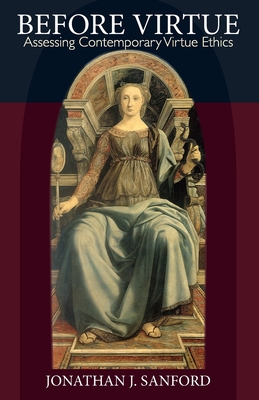Before Virtue: Assessing Contemporary Virtue Ethics

Before Virtue: Assessing Contemporary Virtue Ethics
Classical virtue ethics, exemplified by Aristotle (d. 322 BC), asked: what can we know of human nature and the virtues by which it is perfected in order to live well? Dominant ethical theories today generally avoid the question of human nature, taking deontological (non-metaphysical) or utilitarian (maximizing perceived social benefit) approaches. Elizabeth Anscombe's 1958 article "Modern Moral Philosophy," sparked a revival of virtue ethics. She critiqued contemporary ethical theories and exhorted her readers to recover central features of an Aristotelian approach. Jonathan Sanford finds that despite the common origins of contemporary virtue ethics in Anscombe, the literature varies widely not just in its scope but in its basic commitments. What exactly is contemporary virtue ethics? In Before Virtue, Sanford develops strategies for describing contemporary virtue ethics accurately. He then assesses contemporary virtue approaches by the Anscombean dual standard which inspired them: the degree to which they avoid the pitfalls of modern moral philosophy and the extent to which they exemplify a successful recovery of an Aristotelian approach to ethics. Sanford finds the results to be mixed. But an underlying and unifying theme emerges: an adequate virtue theory must incorporate at least preliminary answers to the questions of the nature of human beings, our ends, and the principles by means of which our ends are best pursued. It is only in light of recognizing the significance of those questions to moral philosophy that one can begin to appreciate the contribution of Aristotelian ethics. Ultimately, Anscombe's judgment about the need to eschew what she designates as modern moral philosophy is vindicated through a recovery of Aristotelian ethics that goes further in addressing those more basic questions than has most contemporary virtue ethics. The concluding chapters of this book contribute to that recovery.
PRP: 343.09 Lei
Acesta este Prețul Recomandat de Producător. Prețul de vânzare al produsului este afișat mai jos.
308.78Lei
308.78Lei
343.09 LeiIndisponibil
Descrierea produsului
Classical virtue ethics, exemplified by Aristotle (d. 322 BC), asked: what can we know of human nature and the virtues by which it is perfected in order to live well? Dominant ethical theories today generally avoid the question of human nature, taking deontological (non-metaphysical) or utilitarian (maximizing perceived social benefit) approaches. Elizabeth Anscombe's 1958 article "Modern Moral Philosophy," sparked a revival of virtue ethics. She critiqued contemporary ethical theories and exhorted her readers to recover central features of an Aristotelian approach. Jonathan Sanford finds that despite the common origins of contemporary virtue ethics in Anscombe, the literature varies widely not just in its scope but in its basic commitments. What exactly is contemporary virtue ethics? In Before Virtue, Sanford develops strategies for describing contemporary virtue ethics accurately. He then assesses contemporary virtue approaches by the Anscombean dual standard which inspired them: the degree to which they avoid the pitfalls of modern moral philosophy and the extent to which they exemplify a successful recovery of an Aristotelian approach to ethics. Sanford finds the results to be mixed. But an underlying and unifying theme emerges: an adequate virtue theory must incorporate at least preliminary answers to the questions of the nature of human beings, our ends, and the principles by means of which our ends are best pursued. It is only in light of recognizing the significance of those questions to moral philosophy that one can begin to appreciate the contribution of Aristotelian ethics. Ultimately, Anscombe's judgment about the need to eschew what she designates as modern moral philosophy is vindicated through a recovery of Aristotelian ethics that goes further in addressing those more basic questions than has most contemporary virtue ethics. The concluding chapters of this book contribute to that recovery.
Detaliile produsului









